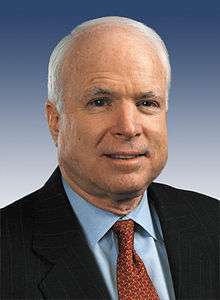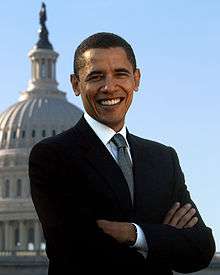US History/2008 Vote
< US History| “ | The people can have anything they want. The trouble is, they do not want anything. At least they vote that way on election day. | ” |
| —Eugene V. Debs | ||
No Incumbent
As a result of the 22nd Amendment to the constitution, George W. Bush is ineligible to run for a third term as President. Also, Vice-President Dick Cheney has announced that he has no intention of seeking the presidency in 2008. Thus, for the first time since 1928, there is no one who is incumbent from either major party running in the presidential election. The public campaign began quite early, with a wide field of candidates jockeying for position for the primaries during 2007, while the Democratic and Republican parties pressured various states to move up the dates of their primary elections, due to the fact of the very early Iowa primary on January 3, 2008.
Primary Season
Republican Primary
Several candidates entered the field in hopes of gaining the Republican Party's nomination for President. Early favorites included New York Mayor Rudy Giuliani, former Massachusetts Governor Mitt Romney, and former Tennessee Senator Fred Thompson. Other candidates, including former Arkansas Governor Mike Huckabee, U.S. Representative Ron Paul of Texas, Arizona Senator John McCain, and U.S. Representative Duncan Hunter of California, received less media attention during the early stages of the race.
The symbolic Iowa caucus resulted in a victory for Governor Huckabee, polling 30% and winning in most Iowa counties. Romney polled a close second, while Senators McCain and Thompson tied for a distant third. In the New Hampshire primary five days later, McCain pulled an upset over Giuliani and Romney, who had until just before the election been favored to poll higher in the contest. Giuliani found that many of his would-be supporters had defected to the McCain camp, forcing him into a disappointing fourth place in New Hampshire. After losing the Florida primary (on which he staked his campaign) to McCain, Giuliani dropped out of the race and endorsed McCain.
As the contenders withdrew their candidacies one by one, the race came down between an increasingly-popular John McCain, Mitt Romney, and a persistent Mike Huckabee. Ron Paul remained in the race until June, but ceased to receive a comparable amount of media attention. Senator McCain eventually edged out all competition, securing enough delegates for the nomination on March 4.
John McCain

John Sidney McCain III (born August 29, 1936) is the senior United States Senator from Arizona, and a candidate for the Republican Party nomination in the 2008 presidential election. Both McCain's grandfather and his father were Admirals in the United States Navy. McCain graduated from the United States Naval Academy in 1958, becoming a naval aviator, flying attack aircraft from carriers during the Vietnam War. On his twenty-third bombing mission over North Vietnam later in 1967, he was shot down and badly injured. He then endured five and a half years as a prisoner of war, including periods of torture, before he was released following the Paris Peace Accords in 1973.
Retiring from the Navy in 1981 and moving to Arizona, McCain entered politics. In 1982 he was elected to the U.S. House of Representatives from Arizona's 1st congressional district. After serving two terms, he was elected to the U.S. Senate in 1986. He was re-elected in 1992, 1998, and 2004. While generally adhering to American conservatism, McCain established a reputation as a political maverick for his willingness to defy Republican orthodoxy on several issues. Surviving the Keating Five scandal of the 1980s, he made campaign finance reform one of his signature concerns, which eventually led to the passing of the McCain-Feingold Act in 2002.
Sarah Palin

Sarah Louise Heath Palin is the current Governor of Alaska and the 2008 Republican candidate for Vice President of the United States. She became the first female Vice Presidential candidate representing the Republican Party and the second female Vice Presidential candidate representing a major political party.
Palin was born in Idaho and raised in Alaska. In 1984, she was the runner-up in the Miss Alaska pageant, receiving a scholarship that allowed her to attend the University of Idaho, where she received a degree in journalism. After working as a sports reporter at an Anchorage television station, Palin served two terms on the Wasilla, Alaska, City Council from 1992 to 1996, was elected mayor of Wasilla (population 5,470 in 2000) in 1996, and ran unsuccessfully for Lieutenant Governor in 2002.
Palin was elected Governor of Alaska in 2006 on the theme of governmental reform, defeating incumbent governor Frank Murkowski in the Republican primary and former Democratic Alaskan governor Tony Knowles in the general election. She gained attention for publicizing ethical violations by state Republican Party leaders.
"Not My Princess"
On the 28th of October, 2008, McCain proclaimed, "There are many who claim that I cannot lead, and that Sarah Palin is my princess. Well, friends, today I have come to tell you that I can lead, and that Sarah Palin is not my princess!"
Democratic Primary
With an unpopular Republican in the White House, many Democrats were eager to pursue the presidency. Early front-runners included New York Senator Hillary Clinton, former North Carolina Senator John Edwards, and Illinois Senator Barack Obama. Others such as Delaware Senator Joe Biden, Connecticut Senator Chris Dodd, U.S. Representative Dennis Kucinich of Ohio, former Alaska Senator Mike Gravel, and New Mexico Governor Bill Richardson also pursued the nomination.
The Democratic Primary featured much more controversy and complexity than that of the Republicans. The Democratic Convention features unelected "superdelegates," who are party officials who may cast their vote for the candidate of their choice. In the early stages of the race, Senator Clinton held an overwhelming lead among superdelegates, while Senator Obama led the popular vote. This disparity, and the possibility that unelected officials could decide the outcome of the nomination was a point of contention among Democrats.
Additionally, the Democratic National Committee penalized the states of Michigan and Florida for changing their primary dates to be ahead of schedule. The DNC decided that the delegates from these states would not be seated at the Convention, effectively nullifying the votes of these states. Senator Clinton (who coincidentally won both states' vote) was a constant proponent of reversing this decision and allowing the delegates to be seated. Eventually a compromise was reached, and all of each states' delegates were allowed to vote, but they were only allowed half a vote each.
As the primary season wore on, the difference between the delegate count of Senators Obama and Clinton changed little. As other candidates dropped out and endorsed one of the two, it became clear that this primary would be a historic one- whether it be the first nomination of an African-American or a woman by a major party for the office of President of the United States. In the end, Senator Obama garnered enough delegates to secure the historic nomination, and he chose Senator Biden to be his running mate.
Joe Biden
Joe Biden has represented the state of Delaware in the United States Senate since 1972, when he was elected at the age of twenty-nine. Senator Biden is recognized as a leader in foreign policy, as well as one of the nation's most influential voices on terrorism, drug policy, and crime. Nationally, Senator Biden has earned a reputation for working on a bipartisan basis with Republican colleagues and bringing real results that matter to Americans.
Throughout Senator Biden's career in public service, the people of Delaware have remained his first priority. From preserving White Clay Creek and miles of Delaware's coastline, to putting hundreds more cops on the state's streets, to fighting to cover healthcare costs for all of Delaware's children, Senator Biden is working to improve the lives of Delawareans.

Election Controversy
The issues of caging lists and other techniques of voter suppression which gave rise to many 2004 United States election voting controversies have not been addressed by further legislation or a regulatory crackdown, and are predicted by Greg Palast (a reporter who has investigated these controversies) to recur to the extent that they could swing the result.
Voter list purges using unlawful criteria threaten election integrity in at least six swing states: Colorado, Indiana, Ohio, Michigan, Nevada and North Carolina.
On October 5, 2008 the Republican Lt. Governor of Montana, John Bohlinger, accused the Montana Republican Party of vote caging to purge 6,000 voters from three counties which trend Democratic. These purges included decorated war veterans and active duty soldiers.
An allegation that the Republican Party in Michigan plans to challenge the eligibility of voters based on lists of foreclosed homes has led to a lawsuit from the Obama campaign and a letter from the House Judiciary Committee to the Department of Justice calling for an investigation.
Libertarian candidate Bob Barr filed a lawsuit in Texas petitioning to have Obama and McCain removed from the ballot in that state. The suit alleged that both the Republicans and Democrats missed the deadline to file, and were present on the ballot contrary to Texas election law. The Texas Supreme Court dismissed the lawsuit without giving an explanation.
Underage Voters
One could see from the newscasts that some of the voters going to the polls were clearly underage. Nickeloden kids poll that finished with Obama 51% and McCain 49% with something like 2.2 million presumably child voters. So far 1,492 fraudulent voter registrations have been identified, some from dead and others for underage voters who were not aware they had been registered by ACORN. The Wall Street Journal noted:“In Ohio in 2004, a worker for one affiliate was given crack cocaine in exchange for fraudulent registrations that included underage voters, dead voters and pillars of the community named Mary Poppins, Dick Tracy and Jive Turkey. During a congressional hearing in Ohio in the aftermath of the 2004 election, officials from several counties in the state explained ACORN’s practice of dumping thousands of registration forms in their lap on the submission deadline, even though the forms had been collected months earlier.”
Obama wins
On November 4, with 364 Electoral votes, Obama won the White House.
Barack Obama did more than thump John McCain in the Electoral College tally; he also handily won the popular vote and redrew the great divide between red states and blue states.
Riding a Democratic tide that bolstered the party's presence in both houses of Congress, Obama snared about 63 million votes to McCain's 55.8 million, according to early totals.
According to exit polls, Obama crushed McCain among women voters (56 percent to 43 percent); voters under 30 (66 percent to 32 percent); African-American voters (95 percent to 4 percent); Latino voters (66 percent to 32 percent); first-time voters (68 percent to 31 percent); and voters making less than $100,000 a year (55 percent to 43 percent).
"I think this is the passing of an old order," CNN senior political analyst David Gergen said as the results rolled in Tuesday night and the outcome became increasingly evident.
"I think what we see ... is a new coalition, a new order emerging. It isn't quite there, but with Barack Obama, for the first time, it's won. It is the Latino vote we just heard about. It is the bigger black vote that came out. Very importantly, it's the youth vote, the 18-to-29-year-old," said the Harvard University professor and former presidential adviser.